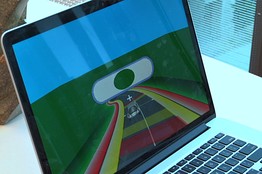 In the future, what if your doctor prescribed you a video game instead of medicine?
In the future, what if your doctor prescribed you a video game instead of medicine?
“Play two of these videogames, and call me in the morning.”
This is exactly the prescription researchers at the University of California, San Francisco expect you to hear soon! In a study, UCSF scientists were able use a specially designed video game to increase the attention spans of older adults and improve their cognitive controls for multitasking. The study, which will be published in Nature on Thursday, is part of a broader effort by the scientific community to understand why playing video games has been shown to help patients who suffer from neurological disorders like attention deficit hyperactivity disorder and even depression. These new video games could become individual treatment therapies, or they could potentially be used in tandem with other medications.
The new study “is a powerful example of how elastic the older brain is,” Adam Gazzaley, director of the UCSF Neuroscience Imaging Center and a co-author of the new study, told the Wall Street Journal. Gazzaley is also the co-founder of Akili Interactive Labs, a start-up focused on designing these early stage interactive and therapeutic video games.
While this study provides much to be excited about, it must also be noted that many studies conducted in the past suggest that playing violent games, for example, could heighten the aggression of frequent players while also stripping away their ability to process real world emotions. Other bodies of research, however, have also linked video games to increased cognitive control, including a recent study by North Carolina University. If these new games stay away from the current trend of violent themes in many kids’ games, perhaps the best of all worlds can be achieved!
The researchers behind the UCSF study spent almost a year designing NeuroRacer, a computer race car game that challenges players to navigate along a winding road and hit a green control button when prompted. As the user gets better, the game algorithm adapts to maintain a consistent difficulty level. This tested the participants’ (aged 60 to 85) ability to multitask over the 12 hours they each spent playing the game over the course of one month.
The researches believe their findings could serve “as a powerful tool for cognitive enhancement,” demonstrating that the brain, even at an older age, maintains the ability to mold and heal itself.
Ann Linsley, a 65-year-old former real estate executive, was a participant in the new study. Prior to playing NeuroRacer, Linsley had difficulty focusing and was often forgetful. She found the game frustrating at first, but after several hours of playing Linsley said “something snapped.” As the game became easier, she explained, “I feel like my brain is working better – even if it’s just to drive a car in a video game.”
So by remaining in a high-interference environment that constantly adapts to your skill level, the study’s participants challenged their brains to be more active. The video game was sort of like food for the mind, like other brain teasers.
Currently Akili has a new version of NeuroRacer in the works, and is also awaiting approval from the FDA to get the game classified as an ADHD treatment.
While the research is still in an early stage, these results open exciting new doors to game designs that could eventually help fight other disorders like dementia and even long term memory loss.


